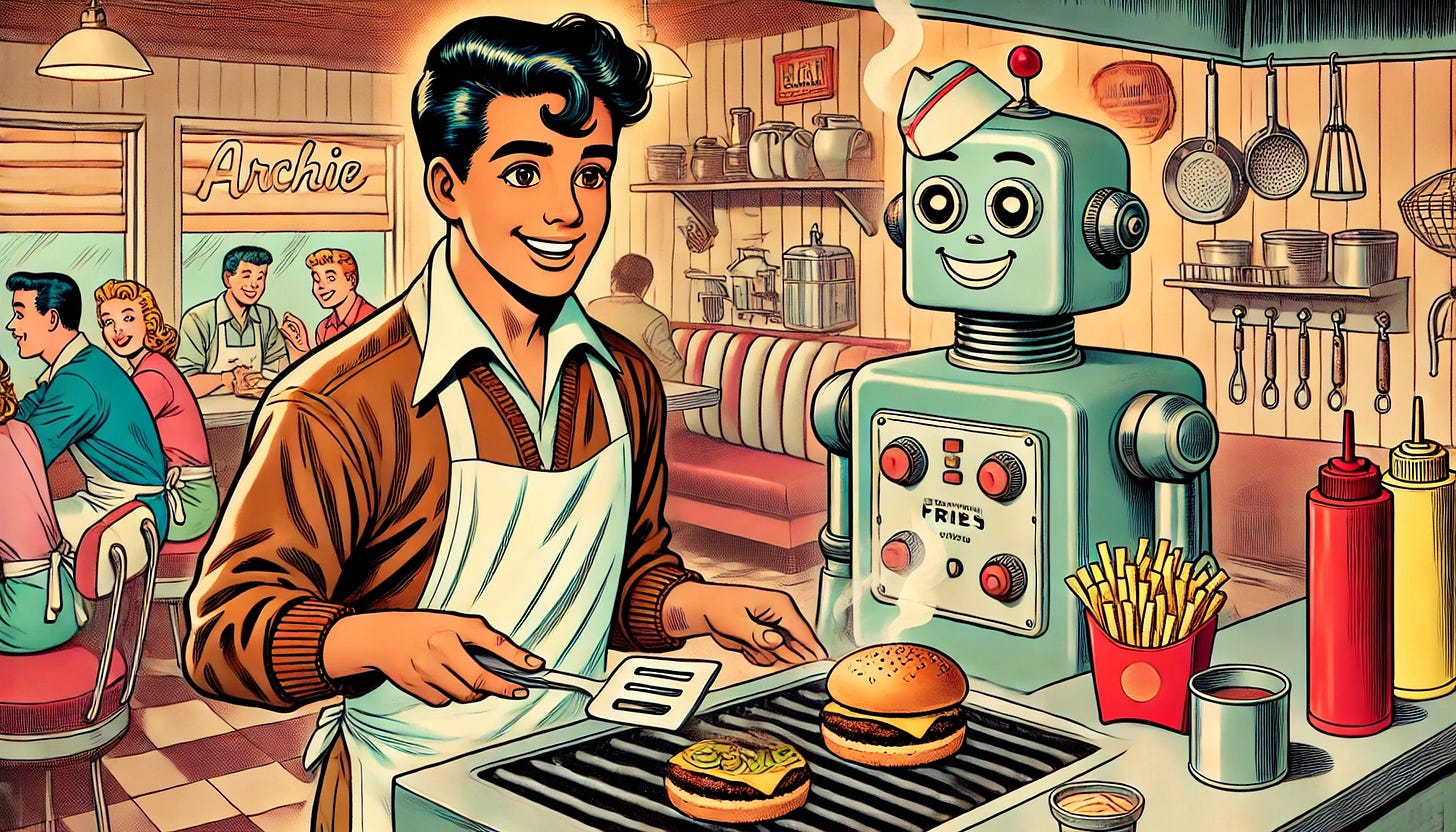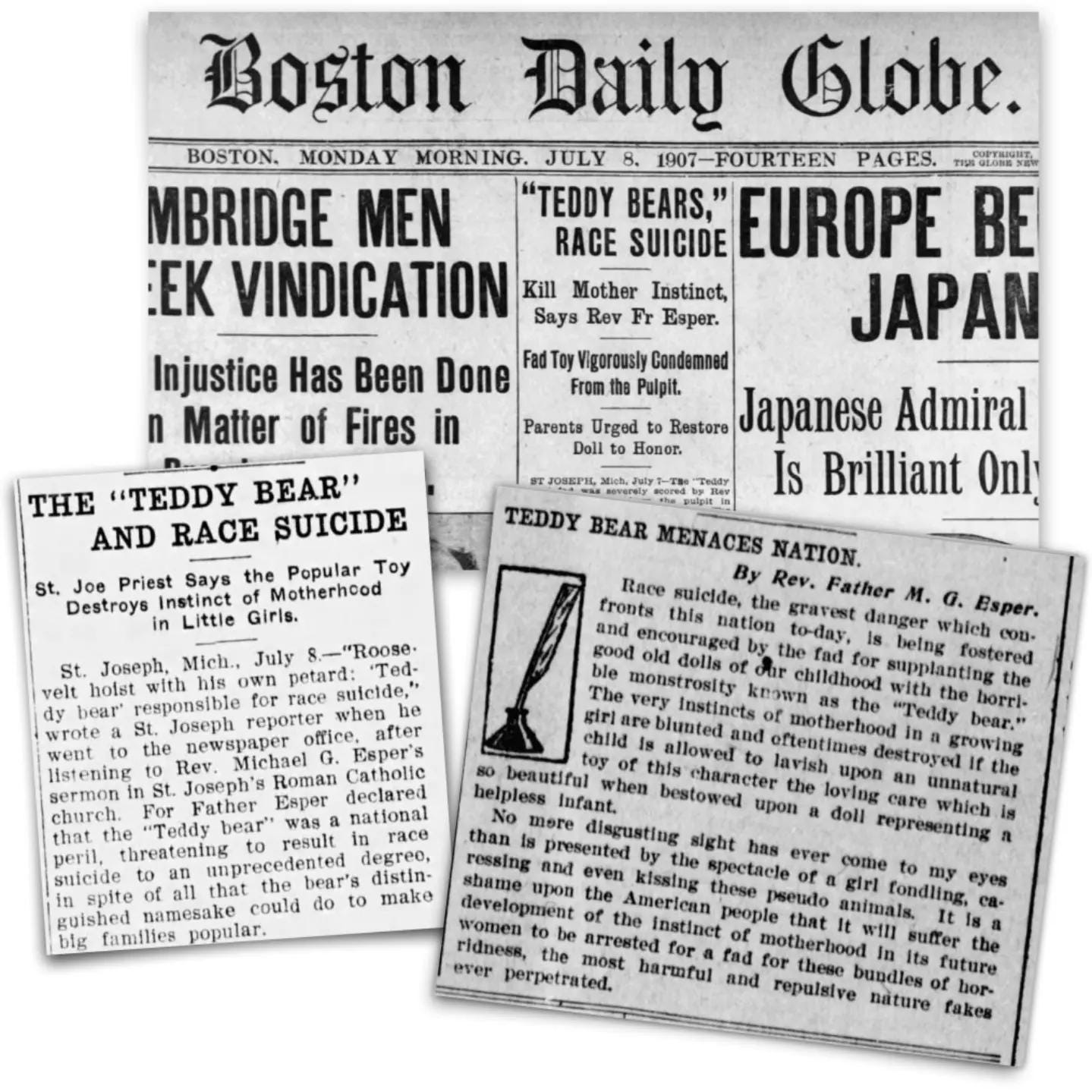#10 - AGI is Coming. Jobs Are Going Nowhere.
5 pre-AI stories for a post-AI future.
I finally read Sam Altman’s article, The Intelligence Age, and I realized him and I have a lot in common.
Sure, he’s the face of AI and I’m writing this article sitting side-saddle on a Greyhound bus seat. But while our present circumstances differ, our visions for the future are more or less the same.
We both believe that:
AI super-intelligence is near.
Jobs aren’t going away.
Most think only one of these can be true, so they believe only one or the other.
I believe both. Turns out Sam does too.
Sam’s article talked about the former: how AI will deliver humanity unimaginable prosperity.
I’m going to talk about the latter: why jobs aren’t going away. Probably ever.
I’ve presented on this topic twice now and both times the message was well-received. So if the threat of AI taking your job is keeping you up at night, I’ve got 5 bedtime stories to help you sleep easy.
These stories range from the invention of the ATM to Mr.Beast counting to 100,000. And they all have something powerful to say about the future of AI.
Let’s get into it.
The Teddy Bear Scare (1907)
Today, we call Teddy Bears “cute”.
In 1907, we called them “RACE SUICIDE”!
Lots of folks believed that if little girls grew up playing with stuffed animals instead of human-like dolls, they wouldn’t develop a maternal instinct.
No maternal instinct = childless marriages = the end of the human race.
To be fair, most people were fine with the bears, but this wasn’t as fringe of an opinion as you’d think. Teddy Bears were even banned in some places.
Today, we don’t think twice about it. We’ve found new things to be scared of.
Moral of the Story: We’re scared of new stuff. Be it Teddy Bears, vaccines, or AI.
The Invention of the ATM (1967)
Here are some things that were invented after the ATM:
Email (1971)
GPS (1973)
Portable Cassette Players (1979)
Camcorders (1983)
Got a feel for how long we’ve had ATMs for? Good. Here comes the hammer.
There are more bank tellers today than there were before the invention of the ATM.
It’s hard to think of many inventions more blatantly designed to automate a human job than the ATM. And yet the job endures, having expanded in scope to take on new work.
Moral of the Story: We overestimate how quickly jobs will disappear and underestimate how quickly jobs will evolve. AI probably won’t take your job, but it will transform it.
The First Electronic Music Festival (1989)
If you wanted to listen to music in the early 1900s, you had to hear it played live.
That changed with the invention of the record player. Now you could have music without the musician.
Obviously, musicians hated that. They saw themselves being replaced.
But musicians weren’t upended. They were upgraded.
They could distribute their music anywhere and everywhere, earning fans in all corners of the world. They could enhance and remix their music in post-production. They could even invent new genres, like Electronic Dance Music (EDM).
The first EDM festival, Love Parade, was hosted in Berlin in 1989 and had 150 attendees. Now, the biggest EDM festival, Tomorrowland, routinely attracts half a million attendees to Belgium from over 200 countries every year.
Moral of the Story: We always find uses for useful technologies. What new jobs will we create with AI agents?
Mr.Beast Counts to 100,000 (2014)
Mr.Beast is the biggest YouTuber of all time. In recent videos, he has:
Bought a private island.
Recreated “Squid Game” in real life.
Given away 40 cars in one video.
He needs a considerable amount of money to pull off stunts like this — money he didn’t have 10 years ago. But he still managed to make mega viral videos back in the day.
In one such video, he recorded himself counting to 100,000. It took him 40 hours.
Counting to 100,000 would take a computer under a second to do. And it’s not like counting to 100,000 is a particularly useful thing to do. So why have 30 million people watched that video?
It’s the same reason why lobsters, which were fed to peasants and prisoners back when they were abundant, are now considered a delicacy.
It’s the same reason why a barista-brewed coffee “tastes better” than a Keurig cup.
It’s the same reason why if a friend sent me a postcard from France, it would mean a whole lot more to me than if they sent me an email with the same content.
Rarity.
People like to give me the “this time it’s different” argument with AI. To be fair, it’s a compelling argument:
“Other inventions left room for humans. What makes human work valuable in a world where AI can do everything a human can do, but better?”
“Rarity” is my answer.
Moral of the Story: We value scarcity. And in an age of technological abundance, the human touch will be priced at a premium.
My Brunch at IKEA (2024)
Last month, my partner and I rented a ZipCar for $80 to return $75 worth of stuff to IKEA (that’s the calibre of brain that you’re picking right now).
We’ll take any excuse to go get brunch at the IKEA cafeteria, and that’s exactly what we did after the return.
As I unloaded our trays of food (complete with toothpick Swedish flags) from our cart onto our table, I saw a toddler and her Dad do the same at the table next to me.
As the Dad was about to set the final tray down, his daughter tugged at his shirt and asked, “Can I do it?”
He smiled and delicately handed her the tray. She struggled and eventually succeeded to lift it up and onto the tabletop. She beamed, so proud of herself.
We have a deep-seated desire to be useful, even from a young age. When kids play, they’re often just pretending to work. They role-play as doctors, cooks, firemen, parents.
Work isn’t just a necessary evil of the time we live in. It’s part of what it means to be human.
Moral of the Story: We want to work. So we will. Even if we’re just deluding ourselves.



